Chapter 22: Interviewing celebrities
The stars who were shining and the one who was imprisoned
After Rosemary and I moved from Australia to the UK in 1968 I topped up my modest income from the BBC World Service by doing radio interviews and magazine articles for a variety of Aussie outlets, mostly 3DB and 3AW in Melbourne, 2GB in Sydney and TV Week. My focus was on Aussies who had done well abroad, or Brits who were well known Down Under. I lost track of the number of people I interviewed, but there were some who stood out. A few became friends. As you will discover later in this chapter, one became notorious.
The most talented contact and interviewee was, by a long stretch, the Aussie comedian Barry Humphries. It would be a conceit to claim him as a friend, but we did have friendly face-to-face and phone chats during the 1970s when he was achieving fame in the UK, chiefly with his characters Dame Edna Everage and Sir Les Patterson. In those days, Barry welcomed publicity and I was one of those able to give it to him. We exchanged private telephone numbers which meant that I didn’t have to go through his agent and he was able to give me a call if he thought he had something worthwhile to discuss. Our chats were mostly serious rather than jokey. Sometimes when I called him, Edna would answer the phone as his secretary, stating that “Mr Humphries is busy at the moment, but will call you once he is free”, which he always did.
When I knew him, he was doing the text for The Adventures of Barry McKenzie, the comic strip in Private Eye magazine, which was splattered with sayings attributed to Australians, but which were mostly made up. There was the famous "technicolour yawn" for drunken vomiting and I remember for some reason him asking me what I thought of "Go stick your head up a dead bear's bum". Both sayings made it into the film version of the comic strip, written and directed by Barry’s friend, Bruce Beresford.
I recorded several of the interviews, one of which was in the toilets at the National Theatre — the only place we could find quiet enough. I no longer have that interview, but I remember it being very echoey. However, I do have this one. It can be found HERE.
As I rose up the ranks at BBC World Service I had less free time to do celebrity interviews. Consequently, I lost touch with Barry. However, in 2023 I was contacted by one of his friends, radio producer Hayley Redmond, who had been commissioned by BBC Radio 4 to do an hour-long tribute to Barry, who had died in April 2023. She had heard my radio interview of 1970 and was interested to know of my relationship with him before he became a global superstar. She came to see me at my home in Ealing, London, and recorded my thoughts, some of which appeared in her programme which was broadcast on February 17 2024 when he would have turned 90. You can listen to it HERE.
I greatly admired Barry but was I was never over-awed in my dealings with him. Nor did I feel over-awed when I interviewed the famous Liverpudlian singer and TV star Cilla Black as she was about to leave for a tour of Australia. She was a confirmation that the bigger the star the less the need to exaggerate her stardom. I met her just once and that was in her agent’s office in central London. She was a joy to meet. There was absolutely no side to her and we had a relaxed chat before and after we recorded the interview, which is HERE.
Another star I enjoyed meeting was the late Frank Ifield who gained international fame with the hit I Remember You and who inspired other Aussies to try their luck in the UK. Not least of these were the Bee Gees. Sadly, I no longer have the recording I made when I met Frank in May 1970 for a TV Week article. However, the link for I Remember You is HERE.
By contrast to Barry Humphries, Cilla Black and Frank Ifield, I found the Malaysian-born Australian singer, Kamahl, a crashing bore, totally full of himself. He was popular in Australia and had hopes of making it big in the UK, but this didn’t happen. During the interview I did for TV Week he was keen to tell me how he had given individual performances to important show business people in the UK. I resisted the temptation to ask if these were what most entertainers called auditions.
In much the same mould was the Australian model and one-time James Bond, George Lazenby. To the astonishment of many in the cinema world, he was chosen to play 007 in On Her Majesty’s Secret Service, replacing Sean Connery who had demanded too much money. George was a former used car salesman and male model and had never acted before. This explained the astonishment. I caught up with him as the Bond movie was released and he was working on another film, Universal Soldier, which died a death.
I recorded a couple of interviews with George, and you will find the link to the one I did in his posh and large Chelsea flat HERE.
It was clear that George felt a need to play the part of James Bond away from the studios. He boasted that he’d had a party for 80 people in his five-bedroom flat the night before and that he was getting eight telephones installed, one of them in the main bathroom. He then drove me into town in his red Porsche sports car, spinning the wheels every time the lights changed to green. He said that he also had an Aston-Martin sports car and three motorbikes. Additionally there was a chauffeur-driven Rolls Royce for use on official business.
****
At the beginning of this chapter I mentioned that one of my interviewees became notorious. So let’s talk about the late Rolf Harris who grew to be one of the biggest TV, art and musical stars in the United Kingdom and his homeland, Australia. This all came apart when he was revealed as a serial sex offender with several women, one of whom was a young friend of his daughter, Bindi. He died at home in May this year from neck cancer after serving three years of a five year, nine months prison sentence.
I interviewed Rolf a few times. Annoyingly, I can’t find the recordings. However, there is a link HERE to one of the TV Week features I wrote for that magazine under my “Bruce Conway” pseudonym.
My wife Rosemary and I went to the Hippodrome Theatre for one of the interviews. Rolf Harris had just completed another TV series and was shortly to return to Australia for a holiday. He did a good, sometimes quite funny interview, but we didn’t have much time to really judge him as a person because he was in a hell of a rush to start rehearsals for his final show. We did hope that his home was tidier than his dressing room. This was impressive from the outside, what with its chrome plated door and embossed stars, but inside it was an absolute mess. Clothes, sheets of art paper and tins of paint were everywhere, and there was hardly room for us to sit down. We arrived as he was in the middle of cleaning his teeth. He spent a fruitless frothing-at-the-mouth search for a towel but had to settle in desperation for a hankie. Such was the life of an international TV star!
I remember that Rolf phoned me after Cyclone Tracy devastated Darwin in December 1974. He wanted to know if he could organise a charity event to raise money for the victims. I suggested he contact a few people who might wish to get involved. I don’t know if the proposed event ever happened, but it was a nice thought.
Rosemary first witnessed Rolf in Australia when she was a teenager working for the Bendigo Timber Company. He was contracted to appear on the company’s stand at the Bendigo Agricultural Show promoting Masonite which he used as his famous “wobble board” in his hit song Tie Me Kangaroo Sport. Listen to it HERE. This original version included an offensive reference to “Abos” (Aborigines), which was removed in later versions because of protests.
Rosemary recalls that Rolf’s Bendigo visit was in 1960. She doesn’t think she was introduced to him, which might have been just as well in view of what emerged about his character much later!
One final addition to the Rolf Harris story: A friend and immediate neighbour of ours in the 1970s and 80s was an events organiser for a charity called PHAB (initials for Physically Handicapped Able Bodied). It had two honorary vice-chairmen. One was Jimmy Savile, revealed after his death as one of the UK’s worst-ever paedophiles, and the other was Rolf Harris. She adored them both — particularly Savile. She would have been deeply shocked — disbelieving even — if she had not died before the scandals became public.
Earlier chapters can be found in the INDEX.



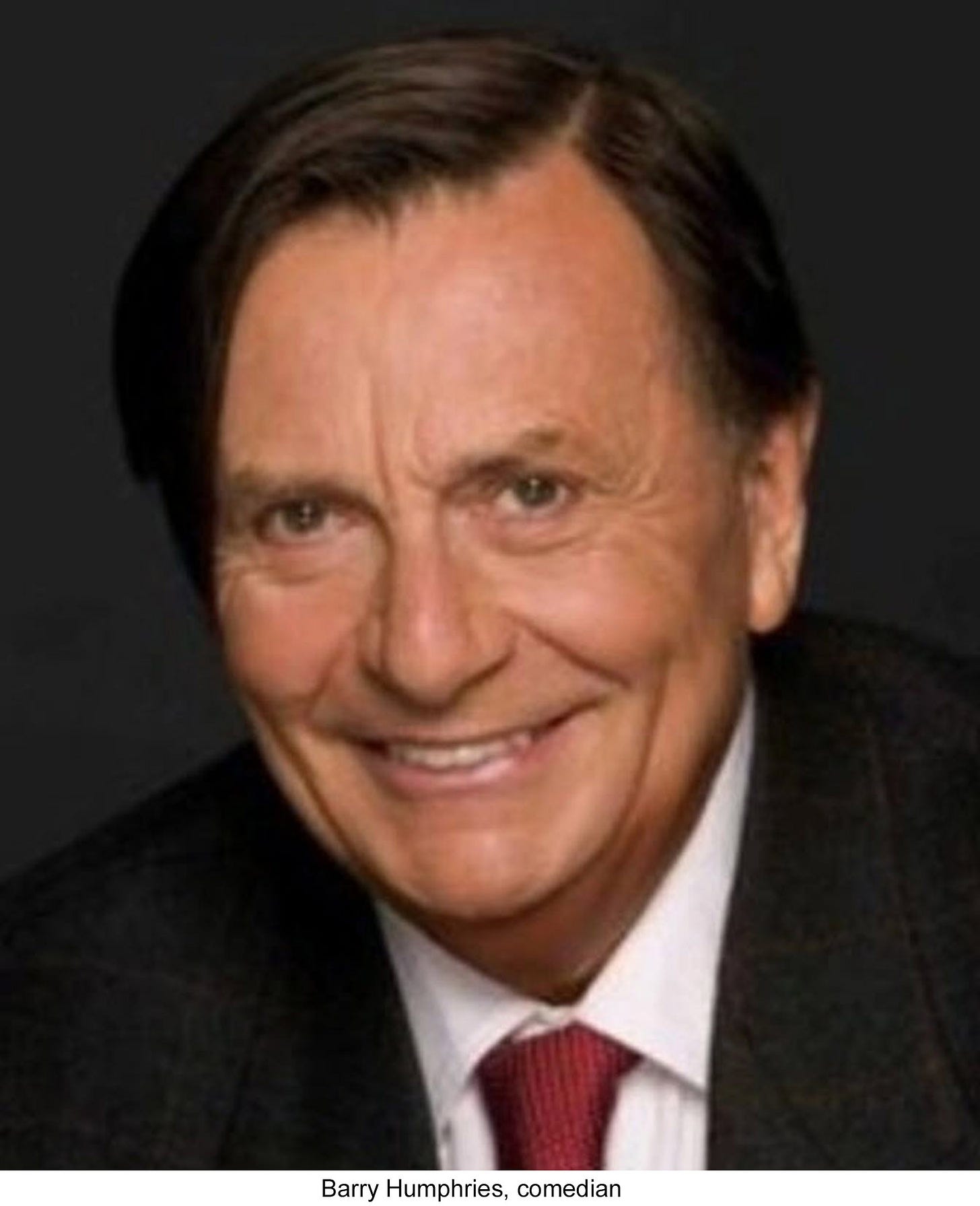
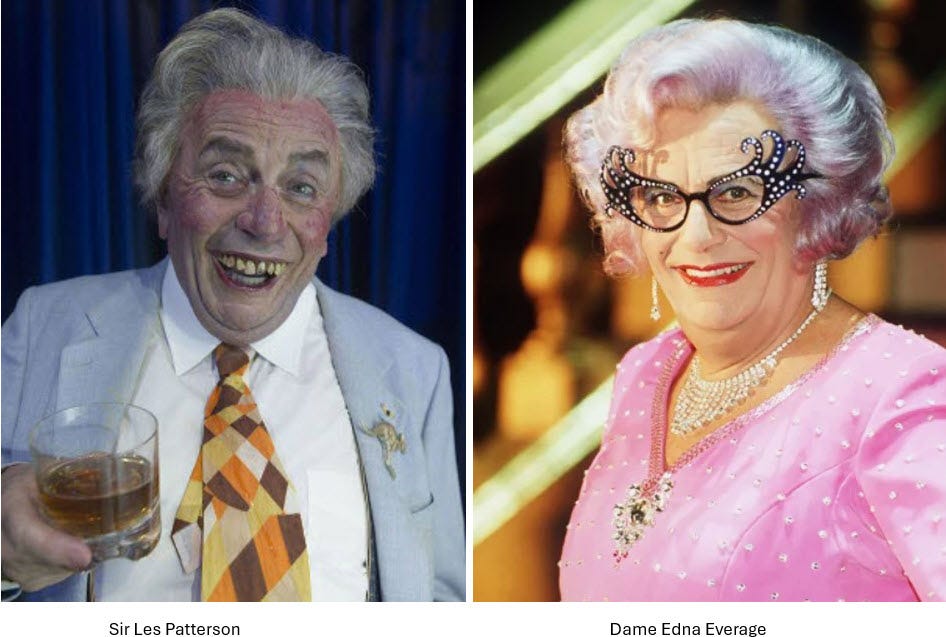
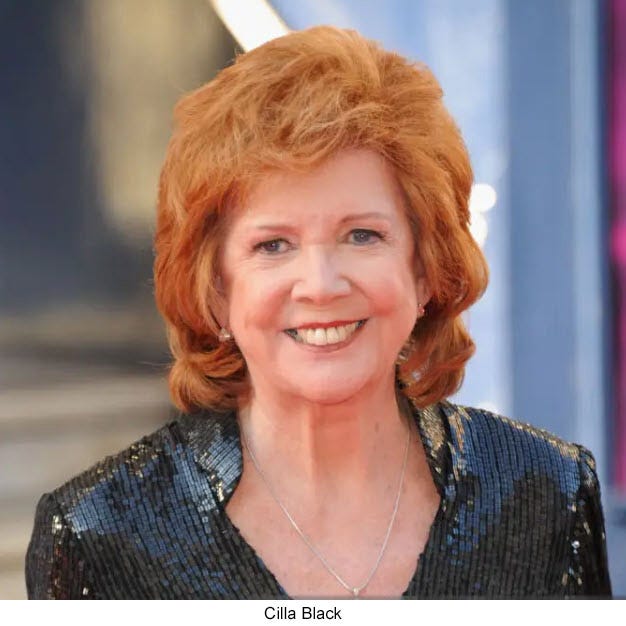

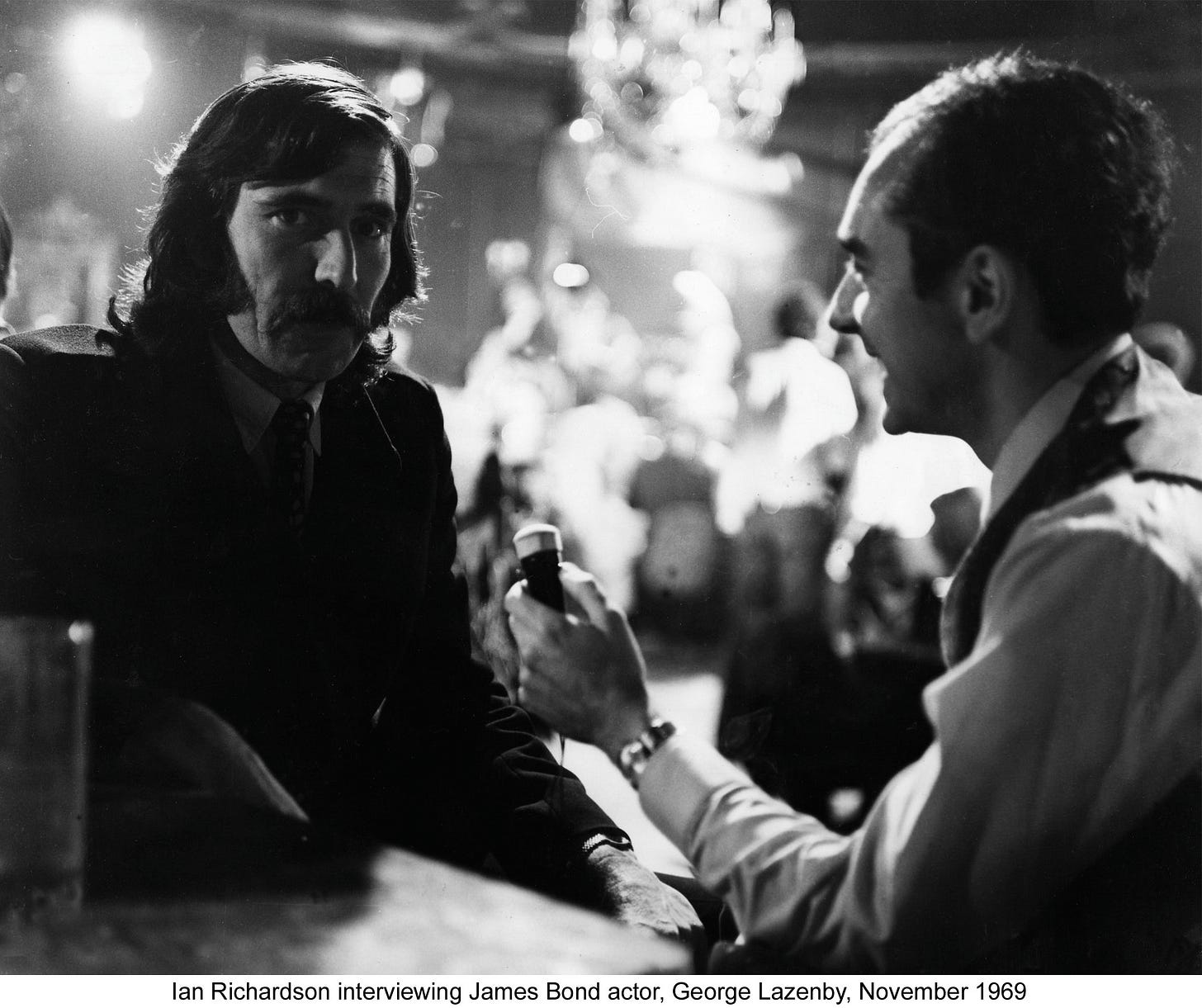
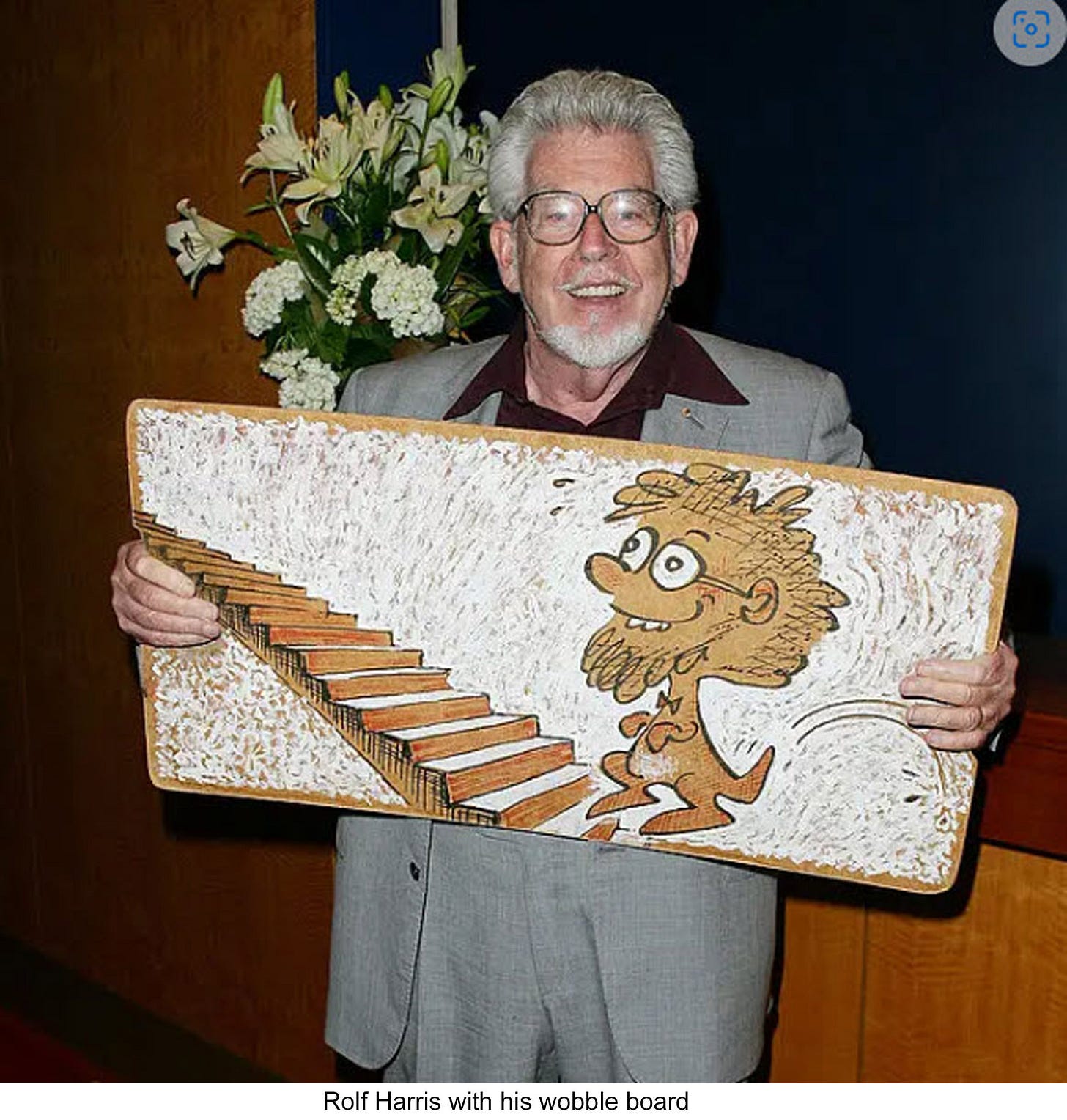
Ian ,another very interesting read about life for you & Rosemary since leaving Australia 🇦🇺
While l read the entire chapter, only 2 of the people really interested me ...personally...
Cilla Black & Frank Ifield always came across "unaffected " with their fame..
Once again I thoroughly enjoyed the read....well done !!!
Cheers...from your friend Helen Australia 🇦🇺
George Lazenby has announced his retirement after being fired from a show for comments judged to be inappropriate: https://www.theguardian.com/australia-news/2022/sep/12/former-james-bond-star-george-lazenby-axed-from-national-music-tour-after-homophobic-comments